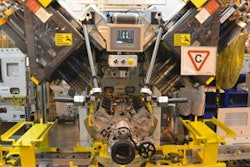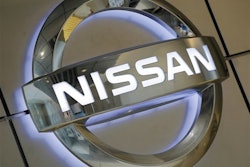Kentucky landed its first major tenant Wednesday at a battery research laboratory in Lexington as the state that ranks third nationally in auto production jockeys for a prominent role in developing next-generation vehicles.
NOHMs Technologies Inc. announced it will locate research, product development and manufacturing operations at the Kentucky-Argonne Battery Manufacturing Research and Development Center. The company plans to invest more than $5.3 million in the project and create up to 162 jobs.
"This move and the facilities here will enable our company to move a lot faster to ... fully develop and commercialize our products," said Nathan Ball, CEO of NOHMs.
The company, founded in 2010 in upstate New York, plans to commercialize its lithium-sulfur batteries that it touts as having wide-reaching applications from spacecraft to cellphones. The company believes its batteries can deliver enough energy at a cost low enough to jump-start demand for electric vehicles.
"If we can simultaneously double the energy and reduce the cost, we can power the next generation of military products and cellphones and enable a company like Toyota to make electric cars that are more cost-effective to buy and to drive than gasoline cars," Ball said.
The company's Kentucky operations will be at the Spindletop research site in Lexington. The battery research laboratory is a joint venture involving scientists from the University of Kentucky, the University of Louisville and Argonne National Laboratory in Chicago.
The company's operations will be a short distance from Toyota's production plant at Georgetown and about an hour from Ford's two auto production plants in Louisville.
Battery makers also have set up operations in Michigan near that state's auto plants.
Kentucky is the nation's third-leading auto producer, behind Michigan and Ohio. Gov. Steve Beshear's office said last month the state was on pace to produce about 290,000 more vehicles in 2013 than it did a year ago, when production surpassed 1 million and was the highest output in the Bluegrass state in five years.
Besides the Ford and Toyota plants, Kentucky is home to a General Motors plant in Bowling Green that produces Corvettes.
Beshear said the arrival of NOHMs will strengthen the state's role in developing next-generation batteries.
His goal, he said, is for Kentucky to become "the epicenter for advanced automobile manufacturing of the future."
"This is an exciting time to have a young company like this to join us here in Kentucky," the governor said.
Electric car sales account for a tiny fraction of overall U.S. auto sales. Through July of this year, sales of electric and plug-in hybrid vehicles totaled 47,452, up 130 percent from a year ago, according to Ward's AutoInfoBank.
By choosing Kentucky, NOHMs is in line for tax incentives that could reach up to $2.1 million for meeting job and investment targets.
The company also will benefit from a program that offers rent subsidies up to $10,000 the first year in Lexington in an effort to recruit emerging tech companies.
UK President Eli Capilouto said the battery research laboratory's emergence shows the value of federal and state support for research and development. The research lab's development was backed by federal stimulus money.
The research center that officially opened last year is also aimed at improving renewable energy technology. The center has entered into joint research projects with such auto manufacturers as Ford and Toyota.
Capilouto noted that NOHMs also has benefited from federal support. He warned that such government-backed support is jeopardized by ongoing budget fighting in Washington. Some key federal programs that back research are at their lowest inflation-adjusted levels in more than a decade, he said.
"We will not be celebrating days like today in the future if we don't get back on track," he said.






















